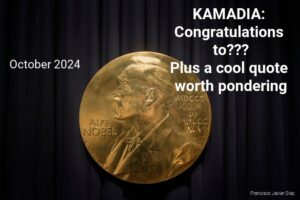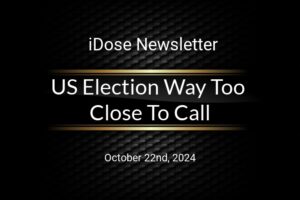By Joseph E. Stiglitz, Nobel Laureate in Economics and University Professor at Columbia University
Kamala Harris has made freedom a central theme of her campaign. Under the heading “Safeguard our fundamental freedoms,” her website explains that: “Vice President Harris’s fight for our future is also a fight for freedom. In this election, many fundamental freedoms are at stake: the freedom to make your own decisions about your own body without government interference; the freedom to love who you love openly and with pride; and the freedom that unlocks all the others: the freedom to vote.”
This messaging is welcome. It is high time that American progressives reclaim the freedom agenda from libertarians and the right, especially now that the right represents the exact opposite. While many on the right drape themselves in the flag, progressives are actually advancing an all-American freedom agenda.
Bringing an economist’s lens to bear clarifies the issue. First, an essential part of freedom is the freedom to do and to act – to live up to one’s potential. People living hand to mouth or on the edge of starvation have no real freedom; they do what they must in order to survive.
Second, in any society of interdependent individuals, freedom for some may entail a loss of freedom for others. As the Oxford philosopher Isaiah Berlin put it, “freedom for the wolves has often meant death for the sheep.” The financial liberalization of the 1990s and 2000s – freedom for bankers – would have meant death for the economy had government not intervened; but since that intervention required billions of dollars of taxpayers’ money, the crisis still reduced the freedom of taxpayers and many workers and homeowners.
Third, a little coercion can meaningfully expand freedom for all. When we work together, we can do things that we cannot do alone; but to avoid the free-rider problem, there may need to be some compulsion.
Fourth, while neoliberal economics expanded the freedom of corporations to exploit others, it did not lead to overall prosperity, let alone shared prosperity. Good economic theory had predicted this even before neoliberalism became fashionable in the Ronald Reagan and Margaret Thatcher era. Moreover, neoliberalism is not even sustainable, because it encourages individual traits and market behavior that undermine the functioning of the economy.
Economies run on trust. The winners of this year’s Nobel Prize in economics – Daron Acemoglu, Simon Johnson, and James A. Robinson – have stressed the importance of institutions; but even seemingly good institutions don’t work when selfish individuals, like Donald Trump, start brazenly violating norms and demonstrating extreme dishonesty.
Fifth, contrary to claims made by conservatives and libertarians like Milton Friedman and Friedrich Hayek, unfettered markets are neither necessary for, nor even conducive to, political freedom. The rise of authoritarian populism has been most pronounced in countries where governments have done too little (to address poverty, inequality, insecurity, and so forth), not where they have done too much.
The contrast between Harris and Trump on core liberties – such as a woman’s right to control her own body – is glaring. On every big issue in this election, Harris would expand Americans’ freedoms, and Trump would curtail them. At the center of Harris’s agenda is a commitment to help ordinary Americans, rather than return to the discredited trickle-down economics that Trump adopted during his presidency. His proposed tax cuts for billionaires and large corporations would add an estimated $7.5 trillion to the nation’s debt over the next few years, and that burden will make Americans’ children and grandchildren less free.
While the post-pandemic worldwide spike in inflation appears to have been tamed, Americans remain rightly concerned about drug and housing prices. Harris has proposed measures to prevent price gouging, but these have been widely (and deliberately) misinterpreted. She is not advocating that the federal government sets prices, and many states already have anti-price-gouging laws to prevent firms from exploiting exceptional situations like hurricanes and floods. If anything, the pandemic showed that such policies need to be strengthened and enforced.
Similarly, the Inflation Reduction Act had provisions to bring down the prices of pharmaceuticals such as insulin – an indispensable (century-old) drug for those with diabetes – from what were obviously exorbitant levels. Nonetheless, the United States could do far more to bring drug prices down closer to the levels found in Europe, where there are stronger laws against abuses of market power. Harris would seek to do precisely that, whereas Trump has promised to dismantle the IRA, and thus to increase prices for Americans.
Trump also promises to raise tariffs – to a rate of 100% on goods from China – which would simply increase the prices of apparel, appliances, and many other goods that ordinary Americans buy. In fact, his entire economic agenda amounts to a massive regressive tax on lower- and middle-income Americans. Their freedom as consumers will be reduced, because they will have less to spend as they please.
Moreover, while Harris has released a comprehensive plan to expand the supply of housing and reduce its cost – and to increase affordability for first-time homebuyers – Trump has remained silent on this critical issue.
Finally, to support Americans’ freedom to live up to their potential, Harris’s agenda includes both a vision and some initial concrete steps toward expanding opportunity, especially entrepreneurship. Such measures would be as good for those hoping to start a business as they would be for the overall economy.
Trump is a living testament to the right’s repudiation of freedom. Fortunately, Harris is showing what it looks like when progressives embrace and advance this core American value.
Joseph E. Stiglitz, a Nobel laureate in economics and University Professor at Columbia University, is a former chief economist of the World Bank (1997-2000) and chair of the US President’s Council of Economic Advisers, was lead author of the 1995 IPCC Climate Assessment, and co-chaired the international High-Level Commission on Carbon Prices.
©Project Syndicate 2024
Note: The views expressed in this article belong to the author, and do not reflect the position of Intellectual Dose, or iDose (its online publication).



